AMD's Athlon 64 X2 4800+ & 4200+ Dual Core Performance Preview
by Anand Lal Shimpi on May 9, 2005 12:02 AM EST- Posted in
- CPUs
Business/General Use Performance
Business Winstone 2004
Business Winstone 2004 tests the following applications in various usage scenarios:. Microsoft Access 2002
. Microsoft Excel 2002
. Microsoft FrontPage 2002
. Microsoft Outlook 2002
. Microsoft PowerPoint 2002
. Microsoft Project 2002
. Microsoft Word 2002
. Norton AntiVirus Professional Edition 2003
. WinZip 8.1
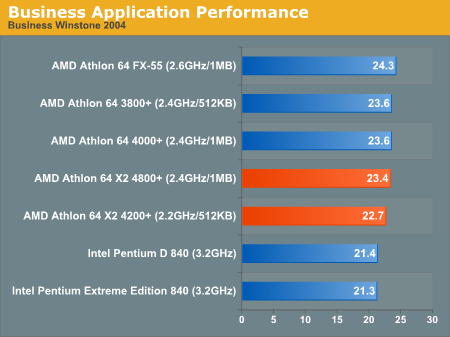
Office Productivity SYSMark 2004
SYSMark's Office Productivity suite consists of three tests, the first of which is the Communication test. The Communication test consists of the following:"The user receives an email in Outlook 2002 that contains a collection of documents in a zip file. The user reviews his email and updates his calendar while VirusScan 7.0 scans the system. The corporate web site is viewed in Internet Explorer 6.0. Finally, Internet Explorer is used to look at samples of the web pages and documents created during the scenario."
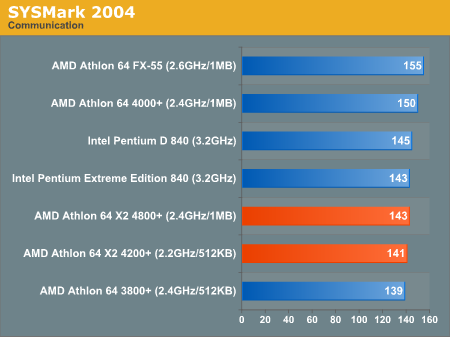
The next test is Document Creation performance:
"The user edits the document using Word 2002. He transcribes an audio file into a document using Dragon NaturallySpeaking 6. Once the document has all the necessary pieces in place, the user changes it into a portable format for easy and secure distribution using Acrobat 5.0.5. The user creates a marketing presentation in PowerPoint 2002 and adds elements to a slide show template."
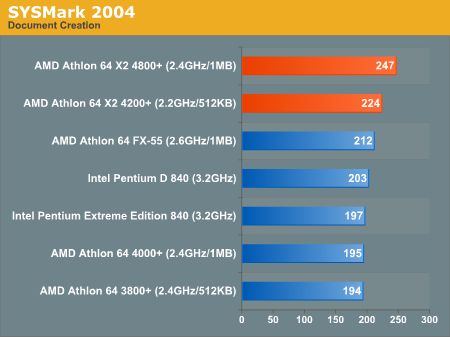
The final test in our Office Productivity suite is Data Analysis, which BAPCo describes as:
"The user opens a database using Access 2002 and runs some queries. A collection of documents are archived using WinZip 8.1. The queries' results are imported into a spreadsheet using Excel 2002 and are used to generate graphical charts."
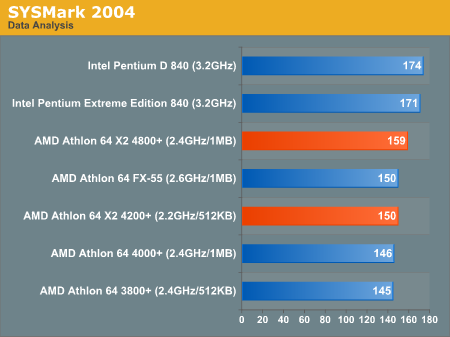
Microsoft Office XP SP-2
Here, we see in that the purest of office application tests, performance doesn't vary all too much. 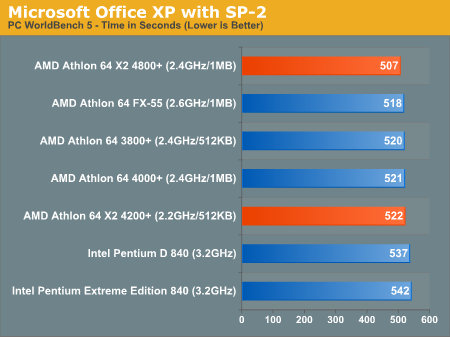
Mozilla 1.4
Quite possibly the most frequently used application on any desktop is the one we pay the least amount of attention to when it comes to performance. While a bit older than the core that is now used in Firefox, performance in Mozilla is worth looking at as many users are switching from IE to a much more capable browser on the PC - Firefox. 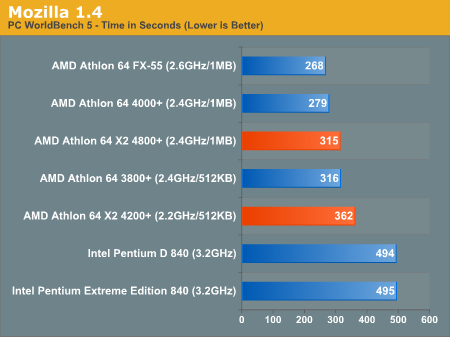
ACD Systems ACDSee PowerPack 5.0
ACDSee is a popular image editing tool that is great for basic image editing options such as batch resizing, rotating, cropping and other such features that are too elementary to justify purchasing something as powerful as Photoshop. There are no extremely complex filters here, just pure batch image processing. 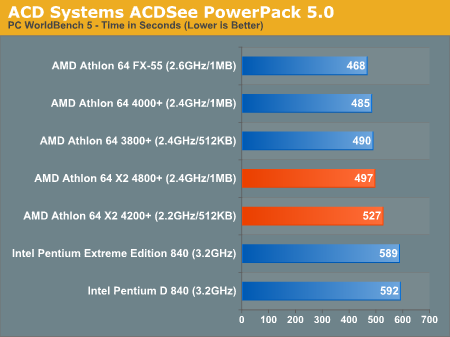
Ahead Software Nero Express 6.0.0.3
While it was a major issue in the past, buffer underrun errors while burning a CD or DVD are few and far between these days, thanks to high performance CPUs as well as vastly improved optical drives. When you take the optical drive out of the equation, how do these CPU's stack up with burning performance?As you'd guess, they're all pretty much the same, with the slight variations between chips falling within expectations. Any of these chips will do just fine.

Winzip
Archiving performance ends up being fairly CPU bound as well as I/O limited. 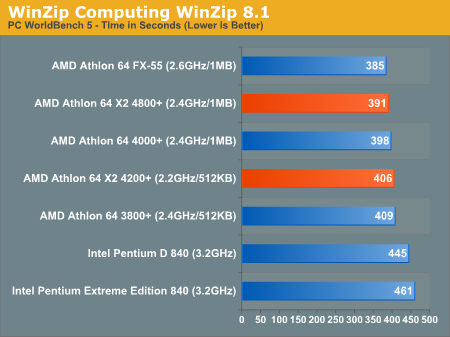
WinRAR 3.40
Pulling the hard disk out of the equation, we can get a much better idea of which processors are truly best suited for file compression. 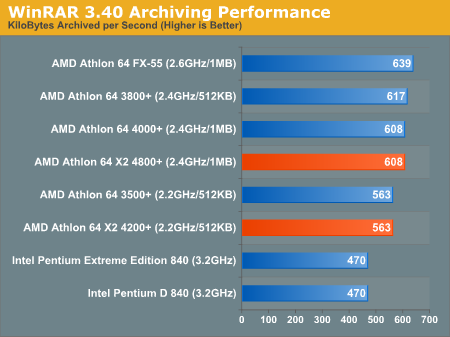










109 Comments
View All Comments
Anand Lal Shimpi - Monday, May 9, 2005 - link
For those of you concerned about favoring one manufacturer or another, remember that these are the very same multitasking tests we've used in every other dual core review we've published here. If I had to guess at why Intel is faster it'd probably be because Intel seems to be a bit faster in things like flash and DVD shrink.As far as not including a faster Intel single core, it really boiled down to time. Intel's fastest single core is faster in some of the SYSMark tests as was pointed out, but in other SYSMark tests it continues to lose. I pointed people back at our original Intel dual core articles for an idea of how Intel's dual core compares to single core. Also, I think our earlier articles make a good case for the advantages of dual core over single core, so this article served more as a "Which Dual Core is Faster?" piece.
As far as the memory timings go, I did not notice any real world performance difference between the two timings.
Take care,
Anand
Quanticles - Monday, May 9, 2005 - link
I dont know what to think as far as this article or Anandtech in general...In this article it seems like AMD destroys Intel in all of the benchmarks except for the ones that Anandtech made. It could be that Intel is just a "better multitasker", or it might not. It would be interesting to do some specific tests though to figure out *where* exactly AMD's chips are getting slowed down in these benchmarks.
As far as design style goes... AMD's chips have an integrated north-bridge and memory controller. The K8 was designed from the start to handle multi-core. The memory controller also helps with memory latency, etc etc. Intel on the other hand slapped together two single core chips into a dual core. It would seem like Intel would have bandwidth issues, and resource conflicts, but maybe that's not the case. Maybe AMD's memory controller is having a harder time handling two cores.
What I do know though is that AMD's chips dominate single threaded applications. It would seem like two of AMD's cores should beat out two of Intel's cores, unless there is some sort of bottleneck in the controlling of the cores.
As far as the biasing.. I'm not sure what to think of that either. Article titles like "The Consequence of Waking Up a Sleeping Giant: Intel Roadmaps Inside" make me wonder. Does anyone remember the OCZ VX Gold memory review? It kinda sucks, but Anandtech needs to make money somehow. It doesnt necessarily mean they're doing questionable things.. but that possibility is always there. =(
Anyway, I'd really like it if we tried to look a little bit closer at the Anandtech composed multi-tasking tests, and maybe try to create a few more tests to figure out where AMD's bottleneck is. That would be world class.
blckgrffn - Monday, May 9, 2005 - link
I second the need for a high end single core P4 in these tests, even if you just include previous results or something. It is hard for us to flip between reviews and try to make comparisons.Thanks,
Nat
AtaStrumf - Monday, May 9, 2005 - link
AGAIN no single core/highest frequency Intel CPU i.e. 3,8 or 3,73 EE!Look up SySmark 2004 Data Analisys for example and you'll see what I mean (192 for Intel 3,73 Vs. 150/159 for AMD X2 4400/4800) That would make AMD not look so good, so you just skipped that CPU 'cause it messes up a pretty AMD winning or just slightly loosing picture ah?
Can you say BIAS?
Hell I'm a HUGE AMD fan, but distorting the picture like this is just not acceptable. Don't just tell your truth, tell the WHOLE truth.
blckgrffn - Monday, May 9, 2005 - link
Viditor:Maybe if we had run these multitasking tests in the past, we might have picked up on this trend of Intel actually being faster in multitasking than AMD, but who could really know for sure? I am guessing that we are seeing the benefits of long pipelines allowing for greater parellism (sp?), and since we are doing things that really don't do much branching (like video encoding) we are seeing what Intel wanted to have happen along. Just a thought. I am a big AMD proponent, but for some reason the high end P4's have *felt* like faster desktop processors to me.
We definitely know that AMDs memory access technique is much better yet more expensive than Intels, so that definitely can't be it. What I found interesting is how the dual core was slower in some single threaded apps even at identical clockspeeds and cache size. Also, in some of the benchmarks, 512K of cache certainly looks to perform better. Did AMD not increase the depth of the sets of the cache to double it to one meg? Or did they take the lazy way out and just double the number of sets like Intel on the Prescott, driving up the latency?
Sorry for the long post!
Nat
Viditor - Monday, May 9, 2005 - link
One other critique Anand...On the Intel platform, you used DDR2-667 with 4-4-4-15 timings, and on the AMD platform you used the DDR400 with 2-2-2-5/1T timings.
Please correct me if I'm wrong, but tests elsewhere show that running at 2-2-2-10 instead of 2-2-2-5 is a big improvement on single core CPUs...did you do any memory comparisons in this case (in your copious free time...)? :-)
drteming - Monday, May 9, 2005 - link
1 core for graphics, 1 core for physics...Jep4444 - Monday, May 9, 2005 - link
#39, when the Venice was launched nearly every benchmark proved SSE3 didnt do much for the corei had heard some negative things about the X2 but after seeing this bench(aswell as a few others from other sites) i can put my skeptimism to rest
hopefully ill be able to pick up one of these things somewhere down the road(i plan to get a new system in about a year and one of these would be a nice fit if the price comes down a little)
michal1980 - Monday, May 9, 2005 - link
#44 just crying cause he can't afford one.Viditor - Monday, May 9, 2005 - link
After reading through many of the reviews out there, it seems that Anand is the only one I've found that does specifically a multitasking (as opposed to multithreading) test. What's interesting is that in all of the multithreading results, the X2 4800+ wins handily across the board...but NOT in Anand's multitasking benches.Does anyone have a theory for this?